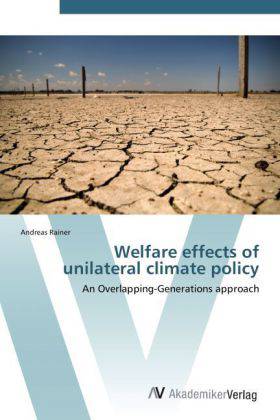
Bedankt voor het vertrouwen het afgelopen jaar! Om jou te bedanken bieden we GRATIS verzending (in België) aan op alles gedurende de hele maand januari.
- Afhalen na 1 uur in een winkel met voorraad
- In januari gratis thuislevering in België
- Ruim aanbod met 7 miljoen producten
Bedankt voor het vertrouwen het afgelopen jaar! Om jou te bedanken bieden we GRATIS verzending (in België) aan op alles gedurende de hele maand januari.
- Afhalen na 1 uur in een winkel met voorraad
- In januari gratis thuislevering in België
- Ruim aanbod met 7 miljoen producten
Zoeken
Welfare effects of unilateral climate policy
An Overlapping-Generations approach
Andreas Rainer
Paperback | Engels
€ 40,95
+ 81 punten
Omschrijving
There is growing evidence, that human activity is a driving force behind climate change in general and global warming in particular as the 2007-Report of the Intergovernmental Panel on Climate Change (IPCC) suggests. One approach to cope with climate change - i.e. reducing the flow of emissions - is considered in this book by means of an overlapping generations model of international trade. It pursuits the goal of modeling the impact of unilaterally conducted active climate policy. To this end, a two-country world economy is constructed in terms of an overlapping generations-model. Government debt as one of the prominent issues in contemporary economic policy as well as the question of welfare is considered. Both dynamic efficiency and the net foreign asset position turn out to play an important role in this context.
Specificaties
Betrokkenen
- Auteur(s):
- Uitgeverij:
Inhoud
- Aantal bladzijden:
- 72
- Taal:
- Engels
Eigenschappen
- Productcode (EAN):
- 9783639384079
- Verschijningsdatum:
- 24/01/2012
- Uitvoering:
- Paperback
- Afmetingen:
- 152 mm x 220 mm
- Gewicht:
- 118 g

Alleen bij Standaard Boekhandel
+ 81 punten op je klantenkaart van Standaard Boekhandel
Beoordelingen
We publiceren alleen reviews die voldoen aan de voorwaarden voor reviews. Bekijk onze voorwaarden voor reviews.









